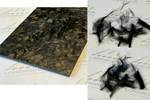Teijin to partner with Fuji Design in carbon fiber recycling
New business structure will incorporate Fuji Design’s proprietary, low environmental impact “precision pyrolysis” technology to produce high-quality carbon fiber from used CFRP for commercialization.

Photo Credit: Getty Images
On Feb. 24 Teijin Ltd. (Tokyo, Japan) announced that it has agreed to form a business alliance with Fuji Design Co. Ltd., a Japanese manufacturer of recycled carbon fibers, to establish a business structure for the production, supply and commercialization of carbon fiber-reinforced plastic (CFRP) products made from recycled carbon fibers using a low environmental impact process.
Fuji Design’s proprietary “precision pyrolysis” technology produces high-quality carbon fibers from used CFRP by removing matrix resins. As a green technology, it is reported to produce some 90% fewer CO2 emissions than carbon fibers produced with virgin raw materials. Fuji Design, which is operating a commercial plant partially subsidized by Japan’s Ministry of the Environment, has been looking to expand the business by developing new applications for its technology.
Teijin, meanwhile, has been striving to lower its groupwide environmental impact, including by reducing its fiscal 2018-level CO2 emissions by 30% as of fiscal 2030 and to net-zero by fiscal 2050. Along with efforts to reduce in-house energy consumption, Teijin also has been developing technologies to recycle materials including carbon fibers.
Through the new business alliance, Teijin intends to strengthen its contributions aimed at realizing a more sustainable world. Under a long-term vision of becoming a company that supports the society of the future, Teijin also is working to achieve the United Nation’s sustainable development goals (SDGs).
Lightweight and high-strength CFRP, which already is used widely in aircraft, industrial and sports applications, is expected to attract increasing demand as a solution for improving the fuel efficiency of vehicles and other products. The challenge, however, is to urgently establish technologies for the reuse of carbon fibers, thereby helping to eliminate the material’s high-impact disposal in landfills or via incineration.
Related Content
-
Recycling hydrogen tanks to produce automotive structural components
Voith Composites and partners develop recycling solutions for hydrogen storage tanks and manufacturing methods to produce automotive parts from the recycled materials.
-
Recycling end-of-life composite parts: New methods, markets
From infrastructure solutions to consumer products, Polish recycler Anmet and Netherlands-based researchers are developing new methods for repurposing wind turbine blades and other composite parts.
-
Plant tour: Daher Shap’in TechCenter and composites production plant, Saint-Aignan-de-Grandlieu, France
Co-located R&D and production advance OOA thermosets, thermoplastics, welding, recycling and digital technologies for faster processing and certification of lighter, more sustainable composites.













.jpg;maxWidth=300;quality=90)


